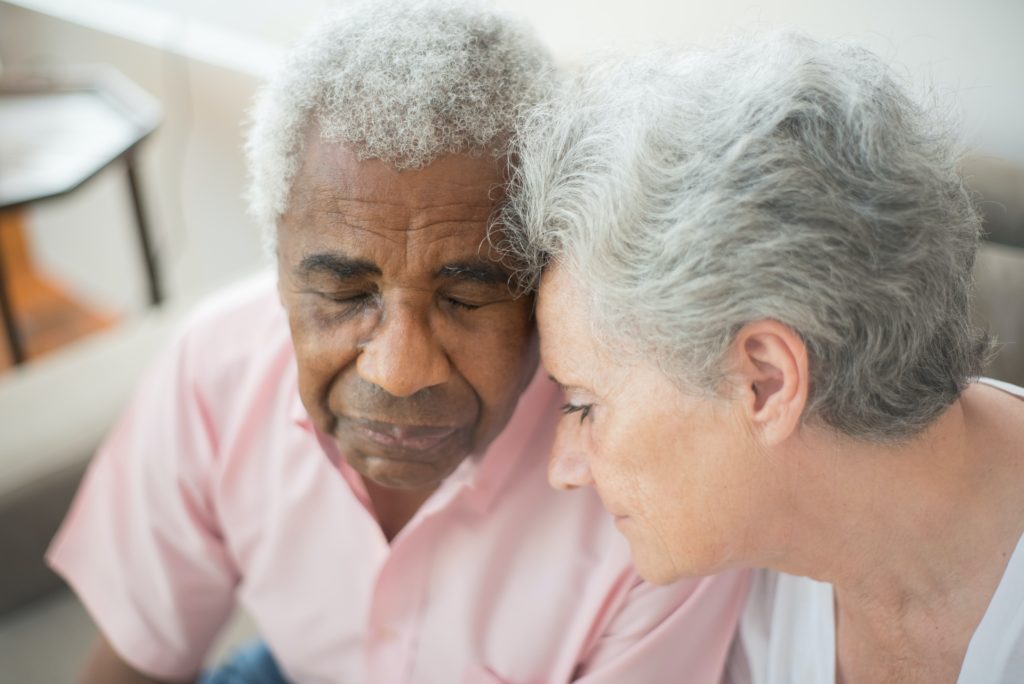In this article, Dr. Mitch Hicks explores some of the emotional impacts and challenges to identity a man faces when diagnosed with prostate cancer.
“Mr. Jones, your biopsy results are back. I’m afraid you have prostate cancer.”

Such news is likely to make one’s heart stick in one’s throat. After what felt like an eternity waiting for the procedure and its results, you finally got the news that you prayed you’d never hear. After all, lots of people with high PSA levels do not actually have prostate cancer (but since pretty much all of those with prostate cancer do have high PSAs, you need to follow up. Hope is not a strategy).
It doesn’t matter that most people with prostate cancer will never require treatment and will die of something else. There isn’t much comfort in knowing that a large percentage of men treated for prostate cancer enter remission and go on to live long, healthy lives. This fear is totally understandable, and the purpose of this article is to share information about some of the emotional impacts of such a diagnosis.
We all know someone….
According to this article on WebMD.com, one in six men will develop prostate cancer over the course of their lifetime. This statistic is not comforting at all, though it does mean that even if you are not personally being treated someone you know is. Chances are you know people with horror stories.
The word “cancer” strikes fear into pretty much everyone. There is a good chance that the stream of thoughts going through your mind center around being in the fight of your life and fear of how others might be affected if you die. Cancer is a word so synonymous with facing down death that even when a cancer is known to be very treatable and survivable, we still experience a lot of fear.
Prostate Cancer Challenges Manhood
Some of the treatments for prostate cancer are brutal. Surgery usually results in the loss of the ability to achieve and maintain an erection, which may or may not be alleviated with medications or other interventions. Hormone treatments that work to eliminate testosterone result in greatly reduced energy levels and a lack of interest in sex to the point that he simply does not feel like himself anymore. It’s as if a part of himself has died….a really important part.
These effects hit the heart of what society tells us about what it means to be a man:
- If his penis does not work right anymore, he’s not going to feel like a man
- If he’s not interested in his partner anymore, he’s not going to feel much like a man. Even worse, this can leave him feeling like he is a major disappointment to his partner or even stoke worry that the partner will find someone else.
- The feats of strength are not just a funny Seinfeld bit for the holidays. If a man feels that he can no longer do the things that he once did: can’t engage in fitness-related or physical work activities as he once did, can’t accomplish things like he did, or is maybe for the first time experiencing depression, he might not feel like much of a man.
These are just some of the most common ways that the effects of treatment for prostate cancer can challenge a man’s sense of self. There is no easy way through this – it’s easy to tell him that there is more to being a man than these things, but very difficult to actually believe.
Focusing on What is Possible.
Speaking of things that are easier said than done, one way through is to focus on what is still possible. The “what’s possible” is really going to depend on each man’s specific set of circumstances, as is the potential for things to return. Being on hormone therapies for a few years will be challenging, but once withdrawn his energy, strength, and sexual interest are likely to return as testosterone levels rise (though they may not). In the meantime, it’s ok to feel loss. At the same time, it can help to stay anchored in the knowledge that at least some of this is temporary.
But once that nerve is cut, the plumbing simply will not work the way it once did. Some men are grateful that there are medications and contraptions that allow for a reasonably-normal sex life, and while on this path rediscover that there is more to sexuality than penetration that can be enjoyed by both him and his partner. And these men I think do better adjusting to this new normal. I would never blame a man who experiences grief for the loss of normal functioning and all that means to him. But I would encourage him to grieve this loss while finding the joy that’s still possible. It may also be surprising to learn that those closest to him have a far broader view of him as a man, husband, and father than he realized. Find those things and appreciate them.
I Can Hear His Partner: I’m Hurting, Too!

Yes, yes you are. It is frightening to watch the man you love go through all of this. You also have felt the changes in sexuality or his interest in you, and these things hurt. His changes in energy level and strength or even the depression and anxiety into which he has fallen have all increased the burdens on you, affected your social life, and these things hurt. I think that this is such an important topic that I intend to make it the subject of a more in-depth article.
One of the hardest things to really understand for female partners in particular is his feeling that a core part of himself has been lost – maybe for just awhile, and maybe forever. This is a shock to the suffer’s identity that is very challenging to understand – especially since you’re likely grateful that your partner is still here with you and the cost was worth it. He might not always feel so sure about the tradeoff.
In Closing
The effects of prostate cancer on the sufferer, his partner, and those around him are significant. Facing down the fear of death while dealing with effects of treatment is daunting. If you’re someone struggling with the aftermath of a prostate cancer diagnosis and its treatment, we are here and happy to help grieve and find what is possible.
